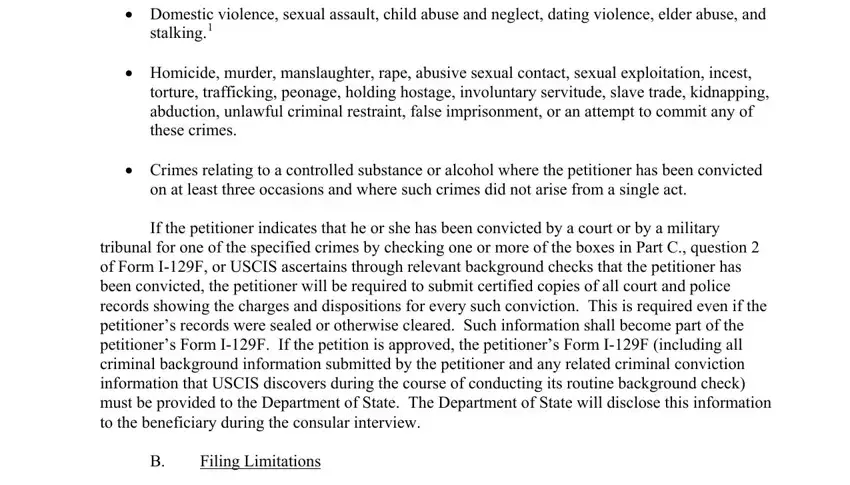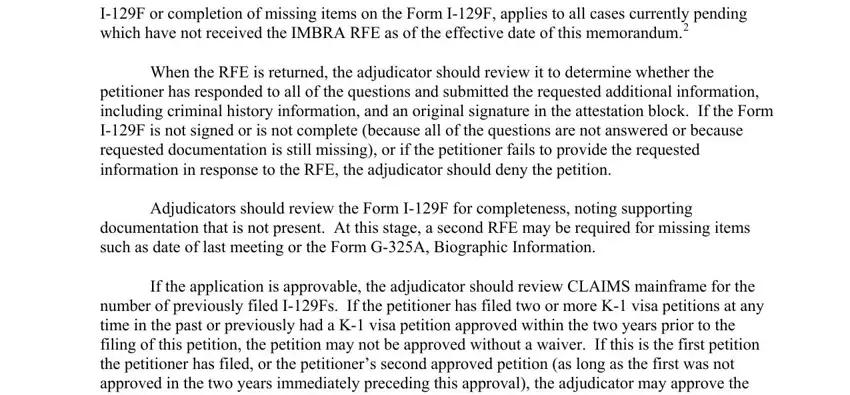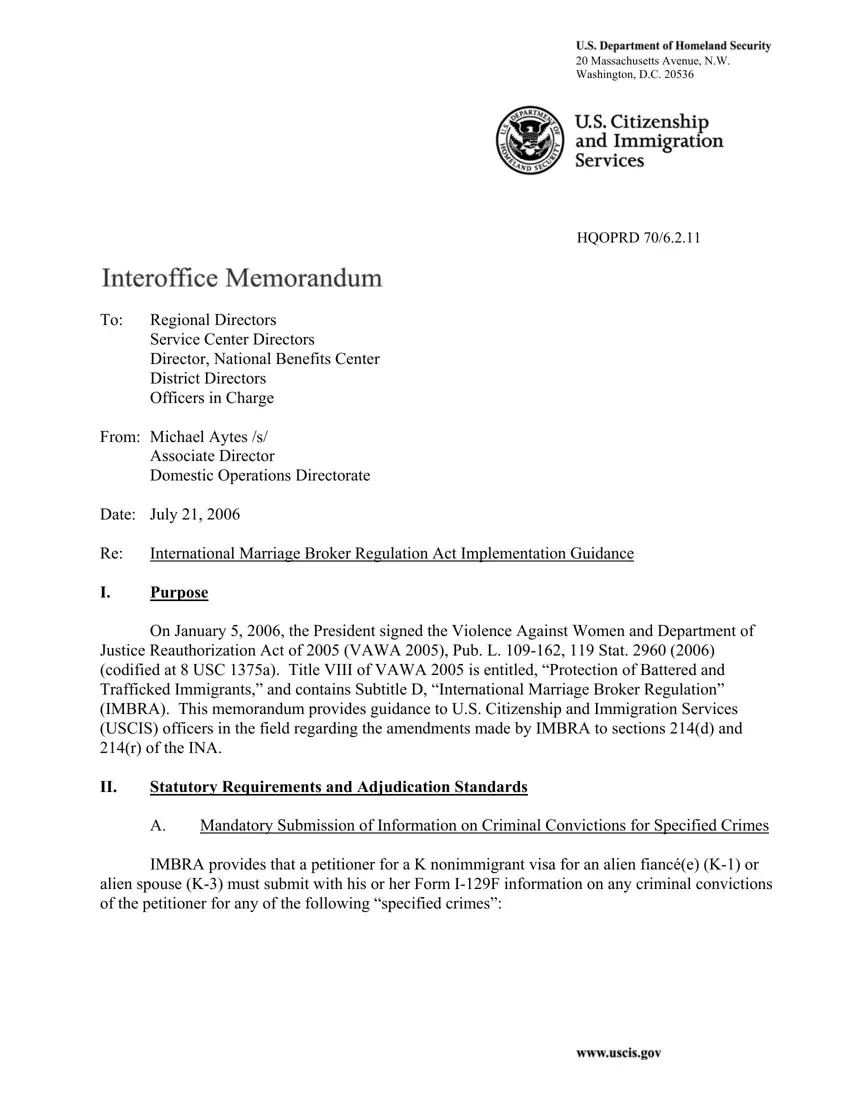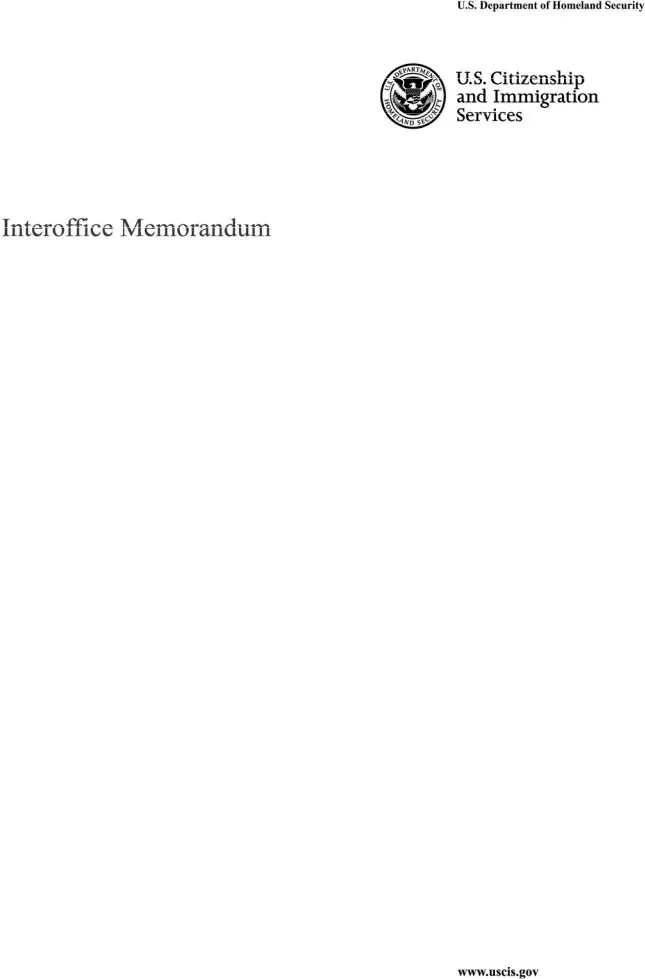20 Massachusetts Avenue, N.W.
Washington, D.C. 20536
HQOPRD 70/6.2.11
To: Regional Directors
Service Center Directors
Director, National Benefits Center
District Directors
Officers in Charge
From: Michael Aytes /s/
Associate Director
Domestic Operations Directorate
Date: July 21, 2006
Re: |
International Marriage Broker Regulation Act Implementation Guidance |
I.Purpose
On January 5, 2006, the President signed the Violence Against Women and Department of Justice Reauthorization Act of 2005 (VAWA 2005), Pub. L. 109-162, 119 Stat. 2960 (2006) (codified at 8 USC 1375a). Title VIII of VAWA 2005 is entitled, “Protection of Battered and Trafficked Immigrants,” and contains Subtitle D, “International Marriage Broker Regulation” (IMBRA). This memorandum provides guidance to U.S. Citizenship and Immigration Services (USCIS) officers in the field regarding the amendments made by IMBRA to sections 214(d) and 214(r) of the INA.
II.Statutory Requirements and Adjudication Standards
A. Mandatory Submission of Information on Criminal Convictions for Specified Crimes
IMBRA provides that a petitioner for a K nonimmigrant visa for an alien fiancé(e) (K-1) or alien spouse (K-3) must submit with his or her Form I-129F information on any criminal convictions of the petitioner for any of the following “specified crimes”:

International Marriage Broker Regulation Act Implementation Guidance
HQOPRD 70/6.2.11
Page 2
•Domestic violence, sexual assault, child abuse and neglect, dating violence, elder abuse, and stalking.1
•Homicide, murder, manslaughter, rape, abusive sexual contact, sexual exploitation, incest, torture, trafficking, peonage, holding hostage, involuntary servitude, slave trade, kidnapping, abduction, unlawful criminal restraint, false imprisonment, or an attempt to commit any of these crimes.
•Crimes relating to a controlled substance or alcohol where the petitioner has been convicted on at least three occasions and where such crimes did not arise from a single act.
If the petitioner indicates that he or she has been convicted by a court or by a military tribunal for one of the specified crimes by checking one or more of the boxes in Part C., question 2 of Form I-129F, or USCIS ascertains through relevant background checks that the petitioner has been convicted, the petitioner will be required to submit certified copies of all court and police records showing the charges and dispositions for every such conviction. This is required even if the petitioner’s records were sealed or otherwise cleared. Such information shall become part of the petitioner’s Form I-129F. If the petition is approved, the petitioner’s Form I-129F (including all criminal background information submitted by the petitioner and any related criminal conviction information that USCIS discovers during the course of conducting its routine background check) must be provided to the Department of State. The Department of State will disclose this information to the beneficiary during the consular interview.
B.Filing Limitations
IMBRA imposes limitations on the number of petitions a petitioner for a K nonimmigrant visa for an alien fiancé(e) (K-1) may file or have approved without seeking a waiver of the application of those limitations. If the petitioner has filed two or more K-1 visa petitions at any time in the past, or previously had a K-1 visa petition approved within two years prior to the filing of the current petition, the petitioner must request a waiver. These limitations do not apply to petitioners for a K nonimmigrant visa for an alien spouse (K-3).
1.General Waiver
The adjudicator may, in his or her discretion, waive the applicable time and/or numerical limitations if justification exists for such a waiver, except where the petitioner has a history of violent criminal offenses against a person or persons. The petitioner may request a waiver by attaching a signed and dated letter, requesting the waiver and explaining why a waiver would be appropriate in his or her circumstances, together with any evidence in support of the waiver request.
1The terms ‘domestic violence’, ‘sexual assault’, ‘child abuse and neglect’, ‘dating violence’, ‘elder abuse’, and ‘stalking’ have the meaning given such terms in section 3 of VAWA 2005 (see attachment).
International Marriage Broker Regulation Act Implementation Guidance
HQOPRD 70/6.2.11
Page 3
Factors the adjudicator should consider include, but are not limited to:
•Whether unusual circumstances exist (e.g. death or incapacity of prior beneficiary(ies));
•Whether the petitioner appears to have a history of domestic violence;
•Whether it appears the petitioner has a pattern of filing multiple petitions for different beneficiaries at the same time, of filing and withdrawing petitions, or obtaining approvals of petitions every few years.
Examples of acceptable evidence to support a waiver request include, but are not limited to: a death certificate, police reports, news articles describing an accident which resulted in the beneficiary’s death or incapacity, or medical reports from a licensed medical professional regarding the death or incapacity of an alien approved for a prior K visa. The determination of what evidence is credible and the weight to be given that evidence shall be within the sole discretion of the adjudicator.
Some examples of possible scenarios are:
•A petitioner who has no criminal history with regard to one of the specified crimes requests a waiver of the filing limitations. The petitioner has one prior approved Form I-129F for the same fiancé(e), and files a report from a physician detailing the illness of the beneficiary that rendered her unable to enter the United States within 90 days. Absent any other adverse factors, the waiver may be granted.
•Conversely, a petitioner who has no criminal history with regard to one of the specified crimes requests a waiver of the filing limitations. The petitioner has previously filed a Form I-129F, for 12 different beneficiaries. The petitioner has submitted no supporting documentation explaining why a waiver of the filing limitations would be appropriate. Absent any favorable factors which may outweigh denial, the waiver should not be granted.
2.Extraordinary Circumstances Waiver in Cases Involving a History of Violent Offenses
If the petitioner has a history of violent offenses, the adjudicator may not waive the filing limitations unless extraordinary circumstances exist in the petitioner’s case. A violent offense is an offense that has as an element of the crime the use, attempted use, or threatened use of physical force against the person or property of another. This includes any of the “specified crimes” identified earlier in this guidance, including crimes involving a controlled substance or alcohol if the offense included an element of intentional conduct that resulted in serious bodily injury or death.
If a petitioner with a history of violent offenses seeks a waiver, he or she must attach a signed and dated letter, requesting the waiver, together with evidence that extraordinary circumstances exist. Evidence of rehabilitation following the petitioner’s criminal conviction(s), combined with
International Marriage Broker Regulation Act Implementation Guidance
HQOPRD 70/6.2.11
Page 4
evidence of other compelling factors, may also be considered “extraordinary circumstances” that warrant the granting of a waiver. Examples of evidence establishing eligibility for a waiver based on extraordinary circumstances include, but are not limited to: police reports, court records, news articles, and trial transcripts reflecting the nature and circumstances surrounding the petitioner’s violent offense(s), his/her rehabilitation, ties to the community, or records demonstrating good conduct and exemplary service in the uniformed services.
Some examples of possible scenarios are:
•A petitioner files a second K-1 visa petition within 2 years of approval of the first petition and also submits evidence that he was convicted for a single violent offense at the age of 16. He is now 44 years of age and has had a clean record during the ensuing 28 years. In support of his waiver request, he provides a statement giving details of the offense he committed, and states that his youth was a factor in the commission of the crime. He submits evidence that he received a diverted sentence for the crime and served his time in a juvenile detention facility until age 21. In addition, the petitioner establishes that he has been an exemplary citizen through service in the military, scholastic achievement, and contributions to the citizenry through recognized public works such as involvement in several philanthropic endeavors. To demonstrate his rehabilitation, he offers parole or probation records and credible affidavits from a social worker, his parole or probation officer, and members of his church and community in general. USCIS background checks verify that he has no further criminal history. A waiver may be granted.
•A petitioner files a second K-1 visa petition within 2 years of approval of the first petition and also submits evidence that he had two felony convictions for aggravated burglary in 1995. He served 3 years and received early release and probation for remaining 2 years of a concurrent sentence. Since 2001, the petitioner claims he has been a model citizen and served his time, but since his release from prison he has been “unlucky” in love and has married and divorced 3 times, the last marriage to a foreign national whom he met through a marriage broker. The petitioner also submits evidence of his good conduct from his current employment and his landlord of 2 years. Absent additional favorable factors, this case does not reflect “extraordinary circumstances” or other compelling factors that would warrant approval of the waiver.
Adjudicators must obtain supervisory approval prior to granting an extraordinary circumstances waiver where violent offenses are involved. The determination of what evidence is credible and the weight to be given that evidence shall be within the sole discretion of the adjudicator.
3.Mandatory Waiver in Cases with a History of Violent Offenses Where Petitioner Was Subjected to Battery or Extreme Cruelty
International Marriage Broker Regulation Act Implementation Guidance
HQOPRD 70/6.2.11
Page 5
IMBRA requires that an adjudicator must approve a waiver request if the petitioner can establish that he or she:
•Was battered or subjected to extreme cruelty by his or her spouse, parent, or adult child at the time he or she committed the violent offense(s), and
Was not the primary perpetrator of violence in the relationship; Was acting in self-defense;
Violated a protection order intended for his or her protection; or
Committed, was arrested for, was convicted of, or plead guilty to committing a crime that did not result in serious bodily injury and there was a connection between the crime committed and the battery or extreme cruelty.
Examples of evidence that may be submitted to establish eligibility for this mandatory waiver include, but are not limited to: police reports, court records, trial transcripts, and newspaper articles that describe the nature of, and circumstances surrounding, the offense. The petitioner may also submit a statement regarding the events leading up to and surrounding the offense(s), and statements from other individuals with personal knowledge of the circumstances surrounding the offense(s). Adjudicators must consider any credible evidence relevant to the waiver request. The determination of what evidence is credible and the weight to be given to that evidence shall be within the adjudicator’s sole discretion.
Whether there was a connection between the crime committed and the battery or extreme cruelty is a matter of evidentiary proof. In order for a crime committed to be considered sufficiently connected to the battery or extreme cruelty suffered by the petitioner, the evidence must establish:
•The circumstances surrounding the crime committed, including the relationship of the abuser to, and his or her role in, the crime committed by the petitioner; and
•The requisite causal relationship between the battery or extreme cruelty and the crime committed.
Some examples of possible scenarios are:
•A petitioner files a second K-1 visa petition within 2 years of approval of the first petition and also submits evidence that she committed a violent offense. With her request for a waiver of the filing limitations, she submits a statement describing years of physical abuse at the hands of the first beneficiary spouse on whose behalf she filed. She also submits police reports and court records that indicate her conviction for felony assault came as a result of a domestic violence situation in which she was defending herself from the beneficiary spouse. A waiver should be granted.
International Marriage Broker Regulation Act Implementation Guidance
HQOPRD 70/6.2.11
Page 6
•A petitioner files her third K-1 visa petition and submits evidence that she was arrested for a violent offense. The documentation provided in connection with her waiver request indicates that she was arrested for kidnapping. The police reports and court records indicate that the kidnapping was of her children and that she was reported to the police by a former husband, who is the father of those children. She also submits evidence that the children’s father regularly beat her and the children, had taken the children, and forbade her to see them. The evidence establishes that the kidnapping charges were dropped and the former husband was prosecuted for battery. The crime did not result in bodily injury and was connected to the battery and extreme cruelty suffered by the petitioner. The officer finds the evidence to be credible. A waiver should be granted.
C. Mandatory Tracking
IMBRA requires USCIS to track repeated petitions for K visas. Upon approval of a second petition for a K-1 or K-3 visa filed by the same U.S. citizen petitioner, USCIS must notify the petitioner that information concerning the petitioner has been entered into a multiple visa petition tracking database. Once a petitioner has two petitions for a K-1 or K-3 visa approved, if he or she files a third petition less than ten years after the date the first petition was filed, USCIS must notify both the petitioner and the beneficiary of the number of previously approved fiancé(e) or spousal petitions. The numerical limitation and waiver provisions described in Section II, paragraph B of this memorandum, however, only apply to individuals filing a petition on behalf of a fiancé(e) (seeking a K-1 visa). Guidance regarding these notification requirements will be issued separately.
III.Procedural Guidance
The provisions of IMBRA became effective sixty days after the date of enactment, or March 6, 2006. While USCIS was amending Form I-129F to reflect the new data collection requirements mandated by IMBRA and preparing to issue implementing field guidance, field offices were instructed to hold in abeyance all cases filed on or after that date. The succeeding paragraphs provide guidance on processing the held cases and new filings of Form I-129F.
A.Treatment of Pending Cases Filed on or after March 6, 2006
Adjudicators must prepare a request for additional evidence (RFE) on all cases filed after March 6, 2006, that were not filed using a version of Form I-129F pre-dating the May 23, 2006, version and that were not accompanied by a sworn statement by the petitioner to the IMBRA questions. The RFE should include the background IMBRA information and required additional questions, as well as request any additional documentation lacking from the initial submission. The RFE template is attached and is labeled “Supplement to Form I-129F.” Issuance of this RFE, which includes a request for any additional documentation lacking from the initial submission of the Form
International Marriage Broker Regulation Act Implementation Guidance
HQOPRD 70/6.2.11
Page 7
I-129F or completion of missing items on the Form I-129F, applies to all cases currently pending which have not received the IMBRA RFE as of the effective date of this memorandum.2
When the RFE is returned, the adjudicator should review it to determine whether the petitioner has responded to all of the questions and submitted the requested additional information, including criminal history information, and an original signature in the attestation block. If the Form I-129F is not signed or is not complete (because all of the questions are not answered or because requested documentation is still missing), or if the petitioner fails to provide the requested information in response to the RFE, the adjudicator should deny the petition.
Adjudicators should review the Form I-129F for completeness, noting supporting documentation that is not present. At this stage, a second RFE may be required for missing items such as date of last meeting or the Form G-325A, Biographic Information.
If the application is approvable, the adjudicator should review CLAIMS mainframe for the number of previously filed I-129Fs. If the petitioner has filed two or more K-1 visa petitions at any time in the past or previously had a K-1 visa petition approved within the two years prior to the filing of this petition, the petition may not be approved without a waiver. If this is the first petition the petitioner has filed, or the petitioner’s second approved petition (as long as the first was not approved in the two years immediately preceding this approval), the adjudicator may approve the petition assuming all other eligibility requirements are met. If not, a Notice of Intent to Deny (NOID) should be issued, detailing the waiver process.
B.Treatment of Forms I-129F approved after March 6, 2006
Cases that were approved in error after the effective date of IMBRA have been identified and returned to USCIS by the Department of State. For such cases, adjudicators should complete a Service Motion to Reopen and Reconsider. The adjudicator should then issue the same RFE described in section A above.
C.Treatment of Forms I-129F filed after approval of revised Form I-129F
The revised Form I-129F became available to the public on June 15, 2006. USCIS will continue to accept older versions of Form I-129F for 30 days following that date (i.e. if post-marked on or before July 15, 2006). The revised Form I-129F has an expiration date of December 31, 2006, and indicates that prior versions will not be accepted. Therefore, after July 15, 2006, all new filings
2RFEs issued prior to the effective date of this memorandum were not based on a review of the pending initial Form I-129F and supporting documentation. In such cases where an RFE was issued prior to the effective date of this memorandum, the Form I-129F should not be denied but a second RFE should be issued to address any deficiencies in the initial filing. A second RFE is not required for cases that were previously approved but reopened for issuance of the IMBRA RFE, where the petitioner fails to respond to the RFE or provide the required criminal history information.
International Marriage Broker Regulation Act Implementation Guidance
HQOPRD 70/6.2.11
Page 8
made on older versions of Form I-129F must be rejected. Petitioners should be directed to the USCIS website or forms request line to obtain the new form.
IV. Use
This memorandum is intended solely for the guidance of USCIS personnel in performing their duties relative to adjudications of applications. It is not intended to, does not, and may not be relied upon to create any right or benefit, substantive or procedural, enforceable at law of by any individual or other party in removal proceedings, in litigation with the United States, or in any other form or manner.
V.Further Information
The provisions of IMBRA apply to all petitions filed on or after March 6, 2006. Personnel with questions regarding this memorandum, please contact Laura Dawkins, Office of Regulatory and Product Management by electronic mail.
Attachment(s)
IMBRA ‘Specified Crime’ Definitions contained in VAWA 2005
Domestic violence: The term ‘domestic violence’ includes felony or misdemeanor crimes of violence committed by a current or former spouse of the victim, by a person with whom the victim shares a child in common, by a person who is cohabitating with or has cohabitated with the victim as a spouse, by a person similarly situated to a spouse of the victim under the domestic or family violence laws of the jurisdiction receiving grant monies, or by any other person against an adult or youth victim who is protected from that person’s acts under the domestic or family violence laws of the jurisdiction.
Sexual assault: The term ‘sexual assault’ means any conduct prescribed by chapter 109A of title 18 U.S. Code, whether or not the conduct occurs in the special maritime and territorial jurisdiction of the United States or in a Federal prison and includes both assaults committed by offenders who are strangers to the victim and assaults committed by offenders who are known or related by blood or marriage to the victim.
Child abuse and neglect: The term ‘child abuse and neglect’ means any recent act or failure to act on the part of a parent or caregiver with intent to cause death, serious physical or emotional harm, sexual abuse, or exploitation, or an act or failure to act which presents an imminent risk of serious harm. This definition shall not be construed to mean that failure to leave an abusive relationship, in the absence of other action constituting abuse or neglect, is itself abuse or neglect.
Dating violence: The term ‘dating violence’ means violence committed by a person:
a.Who is or has been in a social relationship of a romantic or intimate nature with the victim; and
b.Where the existence of such a relationship shall be determined based on a consideration of the following factors:
(i)The length of the relationship.
(ii)The type of relationship.
(iii)The frequency of interaction between the persons involved in the relationship.
Elder abuse: The term ‘elder abuse’ means any action against a person who is 50 years of age or older that constitutes willful:
a.Infliction of injury, unreasonable confinement, intimidation, or cruel punishment with resulting physical harm, pain, or mental anguish; or
b.Deprivation by a person, including a caregiver of goods or services with intent to cause physical harm, mental anguish, or mental illness.
Stalking: The term ‘stalking’ means engaging in a course of conduct directed at a specific person that would cause a reasonable person to:
a.Fear for his or her safety or the safety of others; or
b.Suffer substantial emotional distress.






